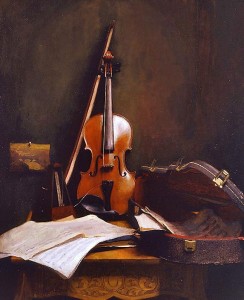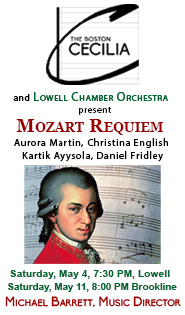BSO program provides musical balm for a city and its victims
It would be easy for some to be cynical about Thursday evening’s “conductor-less” Boston Symphony Orchestra concert at Symphony Hall. After all, the BSO has been without a music director for two years now, and audience patience is wearing thin, wondering about James Levine’s replacement.
But cynical perspectives will have to wait. After a brief fanfare, assistant principal violist Cathy Basrak took the stage, microphone in hand, dressed in her Boston Marathon warmup jacket. Announcing with choked-up pride that she was one of the more than 23,000 runners at Monday’s race, Basrak welcomed a group of special audience guests: friends, family and some of the victims of Monday’s Marathon bombing.
During the subsequent performance, boisterous applause between every single movement made it clear that there were indeed many first-time visitors to Symphony Hall. But small dents in decorum meant nothing on this night. Inviting Boston’s victims and their loved ones was a necessary and embracing gesture. If nothing else, it immediately addressed the elephant that will be in every room where any large group congregates for the foreseeable future. To some extent, all Bostonians are victims of this past week’s events.
This was the second annual performance given over to individual sections of the orchestra, and although the music was chosen months ago, it seemed well suited to the occasion. Simple serenades by Mozart and Dvorak, spotlighting the winds and strings respectively, were accessible and sentimental, without being maudlin. After intermission, Britten’s Young Person’s Guide to the Orchestra (assistant conductor Andris Poga was deployed for this work) offered direct, engaging entertainment.
Fanfares began both halves of the program. For starters, Benjamin Britten’s Fanfare for St. Edmundsbury, which calls for three trumpets, situated around the hall. Principal Thomas Rolfs stood center stage; his compatriots Benjamin Wright and Thomas Siders occupied the first balconies, stage right and left respectively. The fanfare has each instrument individually work out its own melody, and then brings all three join together in a sort of round.
At once inviting and startling, the work brought everyone to attention. After Basrak’s welcome, a double wind quartet of oboes, clarinets, bassoons and French horns took the stage, with bassoonist Suzanne Nelsen making some preliminary remarks.
Throughout the evening individual works were introduced by orchestra members—Nelson, Wright, and violinist Haldan Martinson—who kept their comments personal, avoiding musicology or history. (Nelsen laughingly remarked how she grew up on a pig farm, and at first wanted to play trumpet so she could sit next to a cute guy in that section.) Such remarks, normally inappropriate for a concert setting, seemed welcoming and democratic during this special performance.
If the absence of a conductor was noticed at all, it was during the Mozart Serenade No. 11 in E flat for winds, which was articulated carefully—especially by oboist John Ferrillo and clarinetist William Hudgins—but lingered far too slowly, especially during its dual Menuetto movements, without someone driving the tempo.
The Dvorak Serenade for Strings had no such difficulty. Violins and violas stood, swaying with the rhythm, driving the lush, romantic five-movement work. Exhilarating runs, punctuated by thought-provoking melodic lines, swept performers and audience members into a kind of reverie.
Sir Michael Tippett’s Praeludium for brass and percussion opened the second half, a fanfare of a more complicated sort, noisy and dense. It was a stark contrast to Britten’s phenomenally accessibly Young Person’s Guide, a theme and variations—the tune comes from Purcell—that gets passed around in two dozen different iterations through sections of the orchestra. Variations in the basses, harp (Jessica Zhou), and trumpets were deemed most dramatic by the audience; the final tutti fugue, carefully managed by Poga, brought the emotional evening to a rousing conclusion.
The concert scheduled for 1:30 p.m. on Friday has been postponed. The program is scheduled to repeat 8 p.m. Saturday and Tuesday evenings. bso.org; 617-266-1200.
Posted in Performances


